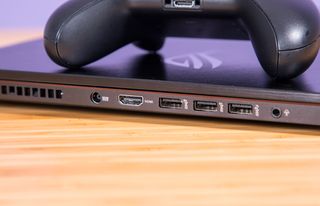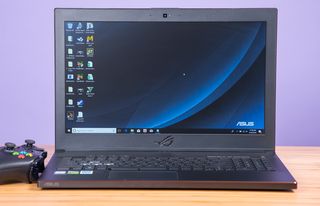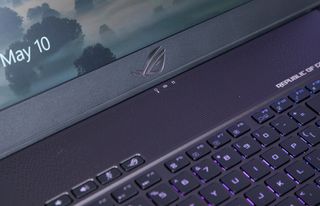Laptop Mag Verdict
The Asus ROG GU501 delivers gaming graphics in a sleek package with solid audio, but the display is too dim.
Pros
- +
Sleek design
- +
Loud audio
- +
VR-ready graphics performance
Cons
- -
Dim display
Why you can trust Laptop Mag
If you haven't noticed, Asus' latest flagship laptop, the ROG Zephyrus M GM501, looks good -- so good, in fact, that the look is trickling down to Asus' mainstream line. The Asus ROG GU501 ($1,500) is almost identical to that flagship machine, but it has a midrange Nvidia GeForce GTX 1060 GPU. You still get a customizable RGB keyboard and strong audio quality, but its weak point is a dim display.
If you're willing to wait, Asus is launching a new Zephyrus M GU502 with 9th Gen Intel Core processors.
Design
You may have seen this one before. The ROG GU501 looks almost identical to the Asus ROG Zephyrus M GM501 we recently reviewed. It's made of a handsome black aluminum with a two-toned effect, and has a large, mirror-shined ROG logo on the right side of the lid that lights up in a menacing red when the laptop is on. The lid also has a small Republic of Gamers logo on the very bottom of the light, and a cutout lets you see the status lights even when the machine is closed.

When you open the laptop, you'll find a 15.6-inch, 1080p display surrounded by a thick bezel. There's a full island-style keyboard with a number pad on the aluminum deck and some volume hot keys above the Function row.

But if you're comparing the GU501 to the Zephyrus, you'll also notice what's missing: an exhaust panel on the back of the machine that opens and closes with the laptop, allowing for a ton of heat to escape. On the GU501, there are two legs in the back that lift the machine up to let a little extra heat escape, but there's nothing as dramatic as the vent.

Despite its slim chassis, the GU501 boasts plenty of ports. On the left side, there are three USB 3.0 ports, an HDMI output, a combination headphone-microphone jack and a power jack. The right side includes a fourth USB Type-A (3.0) port, a Thunderbolt 3 port and a Kensington lock slot.

At 5.4 pounds and 15.1 x 10.3 x 0.7 inches, the GU501 is light for a gaming notebook and quite slim. Acer's Predator Helios 300 is close (5.5 pounds, 15.4 x 10.5 x 1.5 inches), while both the PowerSpec 1510 (6.5 pounds, 15.3 x 10.8 x 1.3 inches) and the Dell Inspiron 15 7000 Gaming (6 pounds, 15.2 x 10.8 x 1 inches) are larger and heavier.
Display
The 15.6-inch, 1080p display on the GU501 isn't as bright as I'd like, but it's vivid. When I watched the trailer for Deadpool 2, there were a few city-based scenes where I wished I could bump up the brightness, though Deadpool's red costume often popped against the gray cityscape. The yellow jumpsuits in the prison scene also stood out in a factory.

When I played Middle-earth: Shadow of War, the game looked darker than it should have, especially as dusk turned to evening. It made it difficult to see Talion's leather cloak and the greenery around an orc outpost.
The 15.6-inch, 1080p display on the GU501 isn't as bright as I'd like, but it's vivid.
Asus' panel covers an excellent 115 percent of the sRGB color gamut, which is more vivid than the PowerSpec 1510 (113 percent), the Acer Predator Helios 300 (81 percent) and the Dell Inspiron 15 7000 Gaming (70 percent). But the mainstream gaming average of 119 percent was slightly higher.
MORE: Best Graphics Performance
On our light meter, the display measured an average of 291 nits of brightness, beating the Helios 300 (226 nits) and the Inspiron 15 7000 Gaming (233 nits). However, it's less luminous than the average (303 nits) and the PowerSpec 1510 (306 nits).
Keyboard and Touchpad
The GU501's keyboard offers 1.4 millimeters of travel, which is just shy of the 1.5 mm we prefer. With 68 grams of force required to press the keys down, the keyboard was slightly stiff. I got used to it, but I also bottomed out more than I would have liked. Nonetheless, I hit 108 words per minute on the 10fastfingers.com typing test, which is normal for me, with my usual 2-percent error rate.

You can customize the keyboard backlighting with the ROG Aura Core software. It allows for a series of effects, like switching between colors or cycling between them, and lets you adjust the colors manually by zone.
The 4.0 x 2.3-inch touchpad is a bit short, but it does the job (and you'll probably use a gaming mouse most of the time anyway). With Windows Precision drivers, it can handle complex gestures like tapping three fingers to summon Cortana, as well as standard two-finger gestures like scrolling and pinch-to-zoom.
Audio
The ROG GU501 is loud and proud. The sound from the speakers easily filled a midsize conference room at just 50 percent of its max volume. The audio is also detailed: When I listened to The Weeknd and Kendrick Lamar's "Pray for Me," the vocals, synthetics and even deep bass came through. However, at louder volumes, the vocals blew out a bit, so I tended to keep it on the quiet side. In the preinstalled Sonic Studio III app, I found that switching to Movie or Gaming modes made that effect worse, so the default music option is likely your best bet.

The ROG GU501 sounded great while gaming, though. As I played Middle-earth: Shadow of War, I could hear Talion's footsteps crunching leaves, and orcs' taunts during battles were loud and clear.
Gaming, Graphics and VR
Asus armed the GU501 with an Nvidia GeForce GTX 1060 GPU with 6GB of VRAM, so it's VR-ready and can play most games at high settings. In fact, I cranked Middle-earth: Shadow of War up to ultra at 1080p, and it ran between 45 and 53 frames per second as I fled from, and attempted to fend off, a particularly angry herd of orcs (one of which was on fire, because, hey, fantasy).

On the Rise of the Tomb Raider (1080p, very high) benchmark, the GU501 ran the game at 36 fps, beating the mainstream-gaming category average (34 fps) and the Dell Inspiron 15 7000 Gaming (31 fps, GTX 1060) but not the PowerSpec 1510 (56 fps, GTX 1070) or the Acer Predator Helios 300 (67 fps, GTX 1060).
Asus armed the GU501 with an Nvidia GeForce GTX 1060 GPU with 6GB of VRAM, so it's VR-ready and can play most games at high settings.
During Hitman (1080p, ultra), the laptop ran the game at 55 fps, falling behind the PowerSpec (60 fps) and the Helios (64 fps) and tying the Inspiron (55 fps), but all of those laptops fell short of the average (68 fps).
On the Grand Theft Auto V benchmark (1080p, very high), the GU501 ran at 48 fps, which is higher than the frame rate from the Inspiron (44 fps) but a frame lower than that from the Helios (49 fps) and behind both the average (56 fps) and the PowerSpec (60 fps).
MORE: Best Hard Drive Speed
The ROG GU501 earned a score of 7 (out of 11) on the SteamVR performance test, so it should work with your HTC Vive, Vive Pro or Oculus Rift. The PowerSpec, with its more powerful GPU, turned in an 11, but the mainstream average is a lower 5.5. The Inspiron got a 5.9, and the Helios notched a 7.1.
Performance
With the latest Intel Core i7-8750H CPU, 16GB of RAM, a 128GB SSD and a 1TB SSHD (with an 8GB SSD cache), everyday computing tasks are a joke to the GU501. Need 25 browser tabs open? I did that in Google Chrome, including one streaming a 1080p episode of Last Week Tonight, and there was no lag at all.

On the Geekbench 4 overall performance test, the GU501 earned a score of 17,940, which is higher than the mainstream gaming average (14,456), as well as competitors like the PowerSpec 1510 (14,223, Core i7-7700HQ), the Acer Predator Helios 300 (13,587, Core i7-7700HQ) and the Dell Inspiron 15 7000 Gaming (10,535, Core i5-7300U), which havelast-generation processors.
Asus' notebook copied 4.97GB of files in 22 seconds, for a rate of 231 MBps. While that's faster than the Helios (188.5 MBps), it's slower than the average (340.3 MBps), as well as the speeds from the Inspiron (339 MBps) and the PowerSpec (391.5 Mbps).
The GU501 paired 65,000 names and addresses on our Excel macro test in 37 seconds, putting it far ahead of the average (52 seconds) and the times from the PowerSpec (1:08) and the Inspiron (1:29).
MORE: Laptops with the Best Productivity Performance
On our HandBrake video editing test, the GU501 took 10 minutes and 22 seconds to transcode a 4K video to 1080p, beating the average (13:16) and the times from the PowerSpec (14:00) and the Inspiron (19:06).
Battery Life
Asus' laptop, like most gaming notebooks, doesn't last all that long on a charge. It endured for just 4 hours and 43 minutes on the Laptop Mag Battery Test 2.0, which continuously runs through web pages, videos and graphics benchmarks over Wi-Fi. That's longer than the average mainstream gaming notebook lasted (3:01), but the Helios (6:01) and the Inspiron (7:17) endured longer.
Heat
Despite not having its more expensive cousin's exhaust vent, the ROG GU501 stayed nice and cool in our everyday testing. It measured just 84 degrees Fahrenheit on the touchpad and 89 degrees on both the keyboard and the bottom.
Despite not having its more expensive cousin's exhaust vent, the ROG GU501 stayed nice and cool in our everyday testing.
Unsurprisingly, it got a bit warmer while gaming. While playing Middle-earth: Shadow of War, it reached 93 degrees on the keyboard, 77 degrees on the touchpad and 104 degrees on the underside, which is well above our 95-degree comfort threshold.
Webcam
The ROG GU501's 720p webcam is fine for simple video chats, but I wouldn't use it to livestream a game. When I took a photo at my desk, some details, like my beard, were blurry. And while the blue stripes on my shirt showed up, the yellow square appeared almost white.
Software and Warranty
The GU501 is chock-full of Asus software. While some of it is helpful for gaming, there's also a ton of bloat.
The most useful is ROG Gaming Center, which shows you device information such as temperature, storage and RAM usage, and also lets you customize fan options. ROG Aura Core lets you program the RGB backlighting, and ROG GameVisual offers different color temperatures for various game genres.
But Asus also bundled in the Asus "Giftbox," which offers deals on storage and apps from partners. It also has WPS Office, a Microsoft Office knockoff, preinstalled, though you only get a 60-day trial of WPS Writer, WPS Presentation and WPS Spreadsheets. There's also a Battery Manager by Asus, but Windows 10 has its own. Asus has also put in Netflix and LinkedIn under its name in the Start menu.
MORE: Longest Battery Life Laptops
Of course, there's also the usual bloatware that comes in every Windows 10 installation, like Skype, Disney Magic Kingdoms, March of Empires: War of Lords and, somehow, both Candy Crush Saga and Candy Crush Soda Saga (you know, in case you're a fan of the series and wanted both preinstalled on your new machine).
Asus sells the ROG GU501 with a one-year warranty. See how it performed on our Tech Support Showdown and Best and Worst Gaming Brands ranking.
Asus ROG GU501 vs. the Competition
When we put the Asus ROG GU501 up against the MSI GS65 Stealth Thin (starting at $1,649) and the Lenovo Legion Y530 (starting at $637), the ROG GU501 held its own quite well.
We praised the Legion Y530 for its premium design and solid performance at sub-$1,000, while we gave higher marks to the GU501 for its stronger, VR-ready GPU and a gorgeous 144-Hertz, 1080p display packed in a sleek ROG Zephyrus design.
Overall, the Stealth Thin won the bout due to its even stronger GPU stuffed into a slimmer profile. It also has longer battery life, at 5:40, and its 144-Hertz, 1080p panel is accompanied by barely-there bezels.
Bottom Line
The Asus ROG GU501 does a lot right: It looks great, it plays games well and its audio quality is solid. Its only real sin is that its display isn't bright enough.
If you can find it at a Micro Center near you, the PowerSpec 1510 is a better deal. At $1,400 ($100 less), you get an Nvidia GeForce GTX 1070 GPU, though that machine comes with a last-generation 7th Gen CPU. If you're looking for a bargain, the $1,140 Acer Predator Helios 300 is another option. It offers a GTX 1060 GPU and longer battery life, though its display is also dim.
Ultimately, that positions the ROG GU501 as a premium player in the mainstream gaming space. If you want the performance of a mainstream gaming laptop with a GTX 1060 but the premium, expensive looks of a flagship Zephyrus, it's worth paying a bit extra for this sleek machine.
Credit: Sean Lucas/Laptop Mag
Asus ROG GU501 Specs
| Bluetooth | Bluetooth 5.0 |
| Brand | ASUS |
| CPU | Intel Core i7-8750H CPU 2.2GHz |
| Company Website | asus.com |
| Display Size | 15.6 |
| Graphics Card | Nvidia GeForce GTX 1060 (6GB) |
| Hard Drive Size | 128GB SSD |
| Hard Drive Type | PCIe m.2 SSD |
| Highest Available Resolution | 1920 x 1080 |
| Native Resolution | 1900x1080 |
| Operating System | Windows 10 Home |
| Ports (excluding USB) | HDMI, Headphone/Mic, Kensington Lock, Thunderbolt 3, USB 3.0 |
| RAM | 16GB |
| Secondary Hard Drive Size | 1TB |
| Secondary Hard Drive Speed | 5,400-RPM |
| Secondary Hard Drive Type | SATA Hard Drive |
| Size | 15.1 x 10.3 x 0.7 inches |
| Touchpad Size | 4.0 x 2.3-inches |
| USB Ports | 5 |
| Video Memory | 6GB |
| Warranty/Support | 1 year |
| Weight | 5.4 pounds |
| Wi-Fi | 802.11 a/b/g/n/ac |
| Wi-Fi Model | Intel Wireless-AC 9560 |
